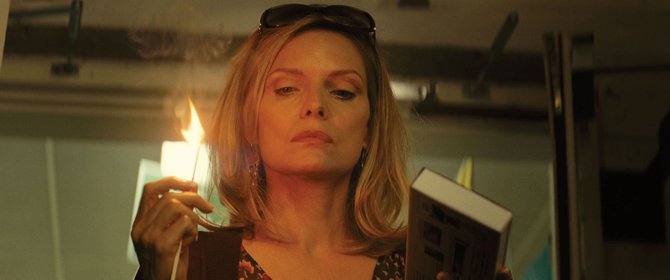The mobster comedy "The Family," bumbles along like a bull in a china shop. Director Luc Besson's script, which he co-wrote with Michael Caleo, sets the film in a village in Normandy, a place known for overripe cheese. Things break, go wrong and end predictably.
After I saw the movie, the characters' mood lingered within me. It was a mood of family and blood bonds, of furtive nostalgia for Martin Scorsese's great gangster movies, and for acting legends Robert De Niro, Michelle Pfieffer, and Tommy Lee Jones, who look older, wiser and at peace here. They also look like they had fun making this film.
What holds the picture together is the cast's conviviality. De Niro and Pfieffer, as father and mother of the Manzoni family unit, are much better than the material. The Manzoni offspring, Belle (Dianna Agron) and Warren (John D'Leo), freshen up the dull edges of a worn and silly story.
The movie opens with a bang. A chisel-faced killer with a big schnoz (Jimmy Palumbo) blasts through the front door of a home where an Italian American family slurps soup. After murdering the family, the killer slices a finger off dear old dad. The finger winds its way through a distribution chain into the ice bucket of a convicted mob leader holed up in the federal penitentiary.
"Not Manzoni," the crime boss barks.
"How much is a man's life worth," Giovanni Manzoni (De Niro) asks in a voice over. Manzoni's life is worth $20 million after he stabbed the mob family in the back by flipping evidence to the feds. Special agent Robert Stansfield (Jones) heads the effort to keep the Manzoni family safe, and it's a challenging job.
"The Family" is a sometimes-funny memoir of Manzoni's life in the witness-protection program. Like many wise guys before him, from his earliest teens Manzoni's only ambition was to be a part of a gangster family. He had a knack for mob life, along with the right amount of psychopathic urges, that proved useful.
Maggie (Pfieffer), Manzoni's spouse, is the perfect mob wife. She takes life on the road in stride. She loves her family, although she recognizes them for sinners. She chats up the FBI protection squad and cooks their favorite treats.
Like their parents, Belle and Warren know how to game the system. They assess their peers' threat levels in the new school and whack their opponents with powerful swinging baseball bats. Belle falls in love with her math tutor, a geek with glasses.
Belle's seduction of her tutor has little to do with the plot, but it was the most powerful scene in the entire movie. It's about the feeling of walls closing in and life careening out of control. The idea of love is Belle's only safety net in a crazy life.
This film isn't based on a true story, but rather collects cinematic sentiments. Giovanni and his family intersperse life lessons from the mafia days with domestic problem solving in witness protection.
How do you deal with a plumber who disrespects you? Beat him up.
How do you deal with the head of a chemical fertilizer company dumping waste into the water supply who disrespects you? Beat him up.
How do you deal with boys and girls who disrespect you? Beat them up.
How do you deal with clerks who disrespect you? Bomb their store.
It's all about respect and how you deal with disrespect.
Henry Hill, a real mobster, disappeared into the anonymity of the federal government's witness-protection program. Hill told everything he knew about the gangster life to reporter Nicholas Pileggi, whose "Wiseguy: Life in a Mafia Family" became a best-seller and then a fine movie called "GoodFellas." This movie does not retell Hill's story, but it endlessly riffs on it.
"The Family" is brazen, brash and forgettable trash. But I did not hate it like some critics. It appealed to my sense of family and dysfunction, and to sentimental attachments to aging actors and a new generation of talent molded in their images.



Comments
Use the comment form below to begin a discussion about this content.